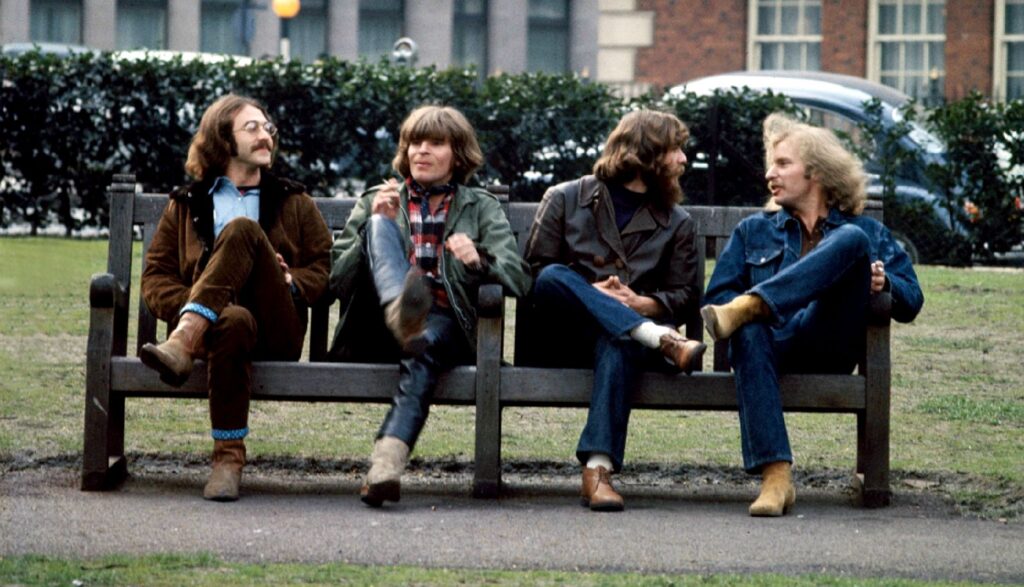
“The Working Man” feels like a lunch pail set down beside the amp—plain, heavy, and honest, with pride that doesn’t need to raise its voice.
If you came to Creedence Clearwater Revival for the big, familiar signposts—riverboats, bad moons, rolling guitars that sound like old engines—you might overlook “The Working Man.” It doesn’t strut. It doesn’t sparkle. It simply shows up, the way the title suggests a man has to. And that’s why it still lands: the song’s power is in its refusal to romanticize anything. It doesn’t beg for admiration, and it doesn’t ask for pity. It just tells the truth in a few tight minutes, like someone speaking through tiredness rather than around it.
First, the anchors—because getting this right matters. “The Working Man” is an album track (not a single) on the band’s debut LP, Creedence Clearwater Revival, released by Fantasy Records in June 1968. On the original track listing, it sits early and deliberately: Side One, Track 2, credited to John Fogerty, running 3:03. (Some streaming metadata lists July 5, 1968 for the album/single bundle, which reflects digital cataloging rather than the original industry release window.)
In chart terms—this is where many write-ups get fuzzy—the song itself did not chart, because it wasn’t released as a standalone single. The album, however, did make a modest but real mark, peaking at No. 52 on the US Billboard 200. And the era’s chart “hook” for listeners was the record’s breakout: “Susie Q” reached No. 11 in the US, giving the debut its first public foothold. That matters for “The Working Man” because it tells you how people often encountered it: not as a headline, but as a deeper cut discovered once you’d stepped inside the album.
Musically, “The Working Man” is classic early CCR discipline: lean arrangement, sturdy groove, and a vocal that sounds more like statement than performance. Even the song’s placement—right after “I Put a Spell on You”—feels intentional. One track is theatrical, a kind of blues-shaman drama; the next turns the lights back on and points you toward everyday reality. There’s no psychedelic haze here, no ornate studio trickery. CCR were already carving out their own lane in 1968: rooted, direct, almost stubbornly unflashy, as if they were pushing back against an era that sometimes mistook excess for meaning.
And the meaning here is simple, but not shallow. “The Working Man” frames labor as a life-shape, not a plot twist. The voice in the song isn’t daydreaming about escape; it’s describing the daily terms of existence—work, endurance, the quiet calculation of getting through. It carries a kind of dignity that’s easy to miss if you only listen for drama. In this song, dignity doesn’t arrive as triumph. It arrives as consistency. Show up. Do what you can. Go home. Repeat.
What makes the track especially poignant—especially with the benefit of time—is how it foreshadows the band’s later, sharper portraits of class and power. You can hear the early outline of the worldview that would eventually give us harsher observations elsewhere in the CCR catalog: the sense that society runs on people who rarely get credited in the story of “success.” Even on a debut album that still leaned heavily on covers and extended jams, John Fogerty is already writing characters instead of clichés.
So if you’re revisiting CCR with older ears—ears that have lived long enough to know that “work” is not merely a concept—“The Working Man” can hit in a different place. It’s not a song that tries to lift you out of life. It stands beside life, shoulder to shoulder, and keeps time with it. And sometimes that’s the most moving kind of music there is: not a promise, not a fantasy—just a steady beat that says, quietly, I understand.